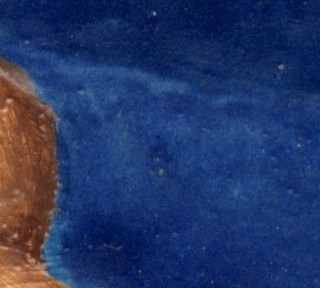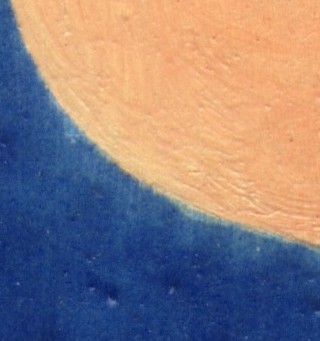Blues of the Past
Friday, November 3rd, 2006Sometime in the 14th century, Cennino d’Andrea Cennini wrote Il Libro dell’ Arte. The book is a treasure because of its detailed information about a wide range of artistic techniques.  For Cennini and his contemporaries, using natural mineral pigments was the best option available to create intense and lightfast blue colors.Mineral azurite yields a handsome blue pigment, somewhat “warm” or inclined slightly towards green. Ultramarine was purified by a labor-intensive process from the lapis lazuli stone, and yielded the most pure blue available. Although the stone itself was semi-precious, the purified pigment was considered a treasure.
For Cennini and his contemporaries, using natural mineral pigments was the best option available to create intense and lightfast blue colors.Mineral azurite yields a handsome blue pigment, somewhat “warm” or inclined slightly towards green. Ultramarine was purified by a labor-intensive process from the lapis lazuli stone, and yielded the most pure blue available. Although the stone itself was semi-precious, the purified pigment was considered a treasure.
These natural blue colors are intense, but not so intense as modern synthetic colors. This meant that painters of past centuries could strive to produce the strongest blues possible, and still arrive at results that were poetic, rather than garish. In contrast, the modern painter, working with colors from a tube, must often fight with the colors, to take away some of their overpowering intensity.
The painting here is an “imaginary portrait” which I painted with oil on panel in 2002. The blues here are underpainted in azurite, and overpainted with natural purified ultramarine, using varying admixtures of white. Differences in the pigment particle size and the degree of purification have an important influence on the colors.
Below are two magnfied views of the painting. In each detail, there is small regions of the warm blue azurite underpainting visible, where the ultramarine (darker blue) does not cover the underpainting completely. Notice the granular quality of the blue pigments, compared to the more uniform mixtures in the skin colors.


(first posted 14 March 2006; update with magnified views, 3 November 2006)